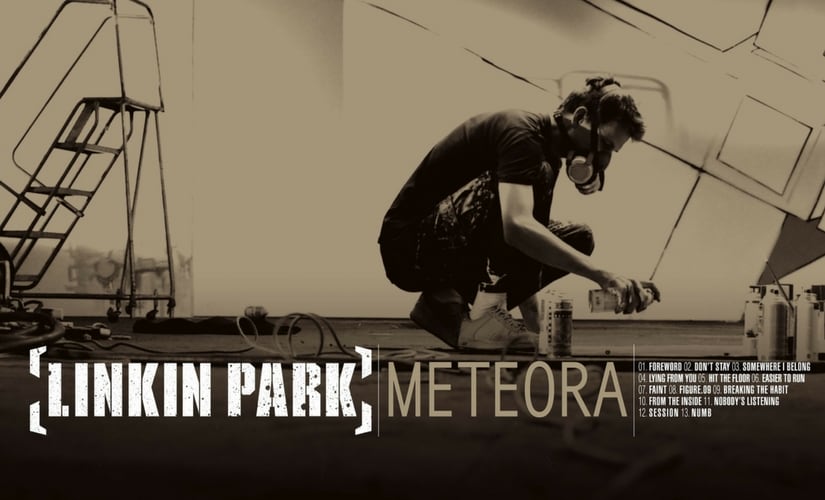The early 2000s were strange times. While the madness surrounding the grunge bands was simmering – with only a handful of bands from the early 90s releasing albums – a new genre trampled the mainstream. Nu-metal, first popularised by Korn, wasn’t easily accepted by the traditional fans of heavy metal. Sure, Korn, and many other nu-metal bands that later emerged on the scene, attained great commercial successes, but became part of one of the most maligned genres in recent times.
Be it the notoriously infamous Limp Bizkit, the dangerously volatile Mudvayne, the strangely distressing Coal Chamber, or even the radio-friendly Papa Roach; bands of immensely different styles found chart success and scored gold and platinum records. Then there were the post-grunge bands. Songs by Creed, Nickelback and Staind were at the top of the charts. In the middle of all this, as a follow-up to their 2000 debut Hybrid Theory, Linkin Park released Meteora.
The six-piece California band had already captured a truly varied global audience with the release of the highest selling debut album of the new millennium; the challenge was keeping the momentum going. Fifteen years after the release of Meteora, the album today stands out as a classic of alternative rock music.
Even though Meteora relied heavily on the basic concepts of Hybrid Theory, Linkin Park somehow found a way to sound sharper, angrier and painstakingly compact. Every track, from the opener ‘Don’t Stay’ to the universally recognised ‘Numb’, Meteora shot through the airwaves with perfectly calculated accuracy.
On Meteora, Chester Bennignton’s melodic singing and bloodcurdling screams became inseparable from Linkin Park’s music. There was a core philosophy behind the lyrics Linkin Park wrote on Meteora; the never-ceasing battle between you and your countless demons. Linkin Park extensively included the concept of you versus yourself, and this became one of their enduring strengths.
While Limp Bizkit’s Fred Durst was half-rapping about the persistent white-man anger (‘Nookie’, ‘Break Stuff’, ‘My Way’), and Papa Roach were making incredibly catchy rap-rock tracks about suicidal tendencies and self-harm, Linkin Park were writing soothingly simple lyrics that connected with millions. Mike Shinoda rapped about the uselessness of even trying while Chester Bennington screamed about his will to heal, let go, and break away — all on the same track (‘Somewhere I Belong’).
Themes of denial, lies, self-destruction, delusions and indelible rage forms the bedrock of Meteora. On ‘Lying From You‘, a song about pushing someone away by weaving a web of lies, Chester repeatedly screams “the very worst part of you is me“. The theme of irreparably damaging oneself is a constant presence on Meteora.
‘Hit The Floor‘ retains a unique hip-hop bounce which many Linkin Park contemporaries tried to emulate. The rage that bellows from the depths of Chester’s mind translates into screams that are among the most recognisable sounds of the twenty-first century. People around the world were well aware of Linkin Park tracks. This was the effect of ‘In the End’, a clearly bleak track about hopelessness that ended up becoming a club banger. With Meteora, Linkin Park proved that their popularity wasn’t a fluke, but it very easily could’ve been. The early 2000s saw a slew of bands that disappeared into oblivion after a scoring a hit or two.
Meteora captured a sound that became synonymous with the band. Linkin Park was methodical – they created a wall of anger around themselves, piercing it from within with shrieks and snares and spine-ratting power chords. ‘Figure.09’ is a brilliant example of how tightly packed and effective a Linkin Park track can be. Chester’s scream on the track is more painful than angry. His ability to switch from one side of anger to another helps understand how complicated one’s feelings can be. On ‘Figure.09‘, too, the idea of you being your own worst enemy is grimly explored (And now you’ve become a part of me/You’ll always be right here/You’ve become a part of me/You’ll always be my fear/I can’t separate/Myself from what I’ve done/Giving up a part of me/I’ve let myself become you).
‘Nobody’s Listening‘ is the one track on the album that is more hip-hop than rock. The song starts off with a Japanese bamboo flute sample and carries a vibe very different from the rest of the album. It was Linkin Park’s sole effort on the record experimenting with sound sampling. The track ‘Session‘ was nominated for a Grammy for the Best Rock Instrumental Performance.
Meteora contained six singles that have become an essential part of Linkin Park’s catalogue: ‘Somewhere I Belong’, ‘Lying from You’, ‘Faint’, ‘Breaking the Habit’, ‘From the Inside’ and ‘Numb.’ For a single album to have this many fan favourites is especially impressive. The last track, ‘Numb‘, matched, if not overshadow, the success of ‘In the End‘. With Meteora, an entire generation learned about loss, hope, disappointment, and venting of anger. Just like generations before them, but with different musicians. In midst of the reckless gloom, Chester and Mike held a fast-extinguishing flame; an example of which can be seen on ‘Breaking the Habit‘, one of the best tracks on the record.
I don’t know what’s worth fighting for
Or why I have to scream
But now I have some clarity
To show you what I mean
I don’t know how I got this way
I’ll never be alright
So, I’m breaking the habit tonight
Meteora did different things for different people. For some, the album became their first taste of English music. For others, it was a gateway to discovering heavier, faster music. For many, Meteora ended up becoming a healer of broken hearts and tortured souls. Anyone who couldn’t find the courage to scream at the top of their lungs lived vicariously through Linkin Park’s music.
Originally Published on firstpost







